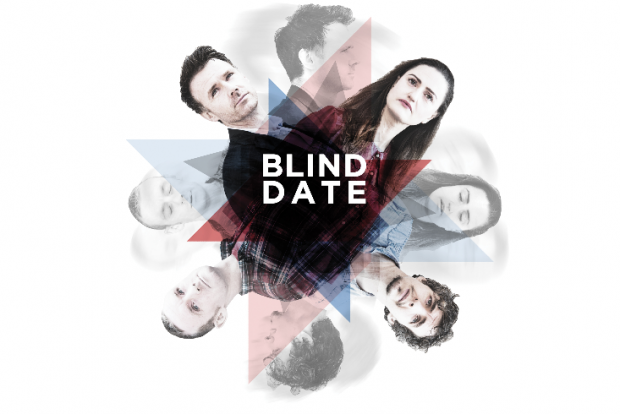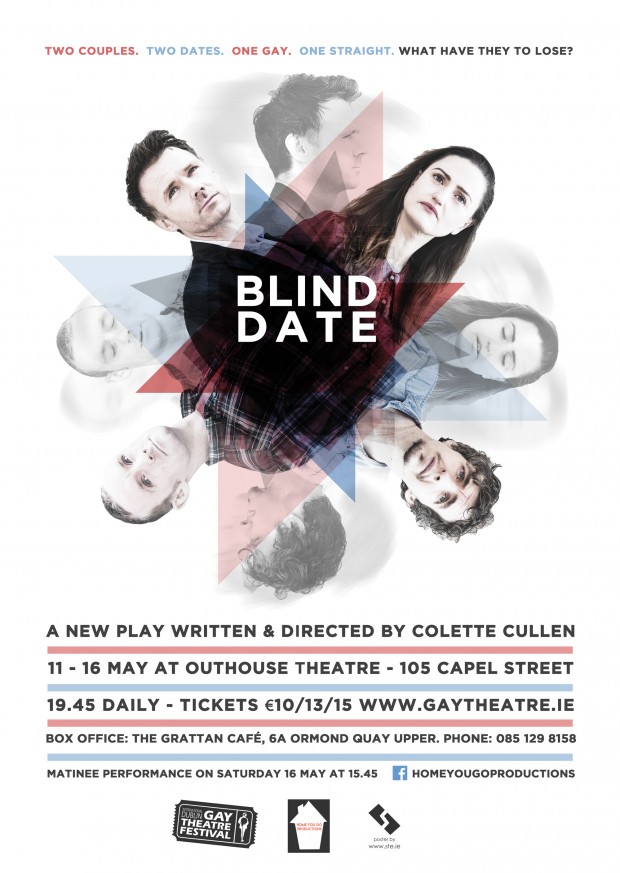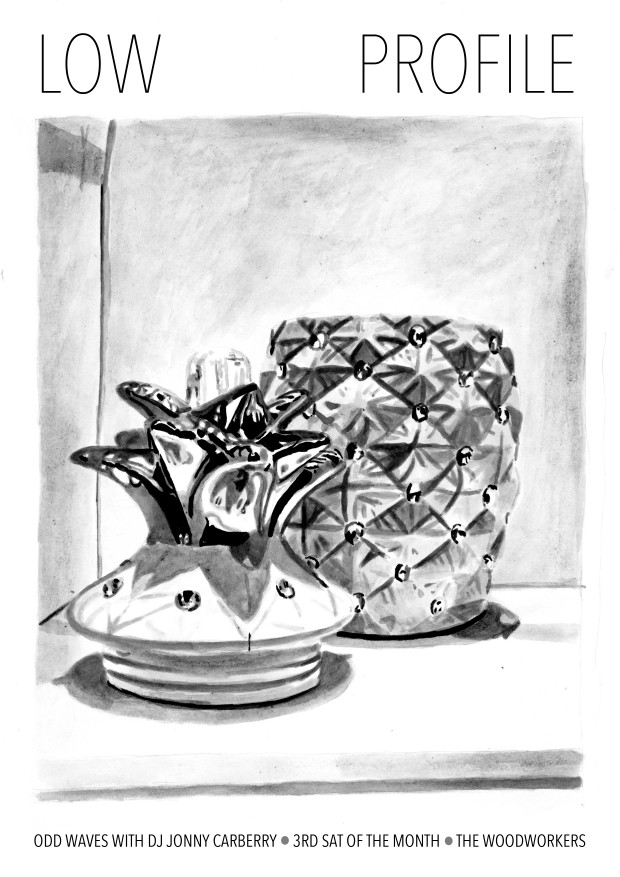Less than a month away from staging their company’s second full-length production at the International Dublin Gay Theatre Festival, producer Madeleine Roche and writer/director Colette Cullen of Home You Go Productions sit down to chat about their latest installment, Blind Date.
Covering both past success and future aspirations, the pair discuss using theatre to break social boundaries by helping audiences find commonalities. As gay issues move further into the limelight and touch more lives every day, they find the timing of their piece and the festival as poignant as could be.
So tell me about the creative process behind Blind Date and how you got to where you are now.
Colette: Well, it’s a story of four people on two different blind dates. One is a straight couple named Sophie and Carl who meet through mutual friends. The other is a gay male couple, Mark and Alan, who meet through Facebook friends. The story started for me a couple of years ago. I was in a bar and this guy came in and started boasting about a date he’d just been on, and my friends and I started thinking about the other side of the date, what did the girl think. So I wrote a short script based on that, and at the time, I was in a writing for theatre module in my MA degree at UCD with Conor McPhearson, so I brought that in. One of the actors, Laura Canavan Hayes, came in to do a reading for the class, and she was terrific, captured the character from the start. I subsequently had a short play called Forever in the festival last year about a lesbian couple, and Laura played a role in that. Then I decided that I wanted to work on the whole theme of the play which is making yourself vulnerable when looking for a relationship. So I developed the first act from the script I did for class which was Sophie and Carl’s part, and then I wrote the second act which concerned the gay male couple.
Is Laura still involved with the process?
Colette: She is still involved, yes, she stayed with the project, and then we cast the other roles, which was interesting. You think of people in terms of what kind of part they’ll make of the role, like ‘what kind of Mark will this person be’, but you also remember that they’re one half of a whole couple. And so, Laura read in auditions for us which was terrific. I like to give the actor their best chance, and when an actor is reading with another actor, it makes it much easier. Plus, Laura gave us great feedback, too. It took a while, but we’re very happy with the cast now and couldn’t imagine anyone else in those parts.
So in terms of the gay couple versus the straight couple, how do you feel about the two parts of the story? Do you feel they’re very distinct in terms of genre, or do you feel that the two halves speak to each other?
Colette: I think the two halves speak to each other in that even though, superficially, there are differences like sexual orientation, deep down we have all the same emotional needs, and I think that’s what the play shows, really. Even though we have preconceptions about lifestyle choices, when it comes down to emotional basics, we have a lot in common.
Madeline: We think that the underlying emotional vulnerabilities that people have are really very similar, and I think the play shows that. The two acts resonate with each other, and it’s interesting that people may have preconceptions about lifestyle and things like that, but with this, you can actually see that really there isn’t this big difference. The emotional vulnerability, people’s hooks, and simply looking for someone is all kind of similar territory; there isn’t this massive difference.
Colette: Yeah, the play is quite intimate in that you get to listen to people’s secrets, the things they don’t talk about. As an audience, you get to witness the before, during, and after of the date, what these people’s hopes are, what they imagine is going to happen, what they imagine the other person is like, and you see that in looking for someone, they imagine the other person is looking for the same thing. And they may or may not be. The audience is in a very privileged position.
So in terms of major take-aways, is that what you’re hoping the show brings to the festival at large? Commonalities and vulnerabilities?
Colette: Yeah, there’s something there for everyone because we’re speaking to the whole spectrum. We’re speaking to the emotional makeup.
Madeline: I think we’re hoping to get an audience from across the board. Obviously, with the festival, I think we’re going to get quite a large gay audience, but we think the piece would appeal to everybody and that people will recognise things in both the heterosexual and straight characters that they might recognise in themselves. I think it’s important because with issues like marriage equality being on everyone’s mind, people are starting to think, ‘Well what if I wasn’t able to marry someone I wanted to marry?’ People are starting to look at these sorts of things as persons.
Colette: Yeah, with the play’s timing with marriage equality, gay relationships are coming into the forefront of the mainstream, now. Lesbians and gay men do have relationships, long term and short term like everyone else, and the campaign has raised awareness of that. People are now looking at what we have in common rather than the differences, now.
How do you feel about the festival’s role in marriage equality and how it’s going to contribute to the effort given how close it is to the vote?
Madeline: Well, what we’re hoping is that the audience that comes to the festival isn’t an exclusively gay audience. We think the quality of the work is high in this piece and in others, so we hope it brings a broader appeal and more awareness. We hope it’s not seen as being for an exclusively gay audience. It’s quite inclusive, really.
Colette: Yea, it is inclusive. A lot of the artists and their subjects have a gay focus, which is important, because it raises awareness for gay culture that isn’t just bars and clubs. It focuses on gay issues that aren’t normally portrayed in the mainstream. I think marriage equality in a similar way shines a light on how similar we are in an area of gay life that people may not know about. Coming out, discrimination, etc., those issues are all important, but looking at something positive like equality, like positive relationships, I think that’s a really good part of the campaign. And it shows people who know someone who’s gay, who have someone in their life that’s gay, that they can do something about it and not just be counted in a passive way. And I think it’s terrific. The festival is like that, too, it’s very positive. It’s showing a whole range of themes in gay life.
Madeline: And it’s a very feel-good kind of festival, in terms of audiences. Audiences come along with a real expectation of enjoying it, and our work with the audiences is very positive in terms of response. I suppose in any festival you can get that kind of buzz, but they’re really switched on when they come around to this one. Everyone knows someone who’s gay; it’s something that affects everyone, now that people are more comfortable being out. And in Ireland, that goes back to just twenty years ago, when gay pride would have been a handful of people walking down the street, and now things have changed so much.
You just recently had a show at Smock Alley called Beasts. How has your success with that run been informing how you’re going ahead with the current production?
Madeline: It’s definitely going to bring an audience to Blind Date that mightn’t have come to the Gay Theatre Festival before.
Colette: Yeah, and Beasts was a comedy, but it had a serious side to it that touched on social issues in a quirky sort of way. We got a lot of confidence from it, and it was the first full piece that I directed and that we produced, and it was very successful which gave us a lot of confidence. So with a play like Blind Date, I suppose we’re hoping the play has a life outside the festival. The festival gives it a platform where we can showcase it and make it accessible to wider audience who might hope to see it somewhere outside the festival.
Madeline: We’re a pretty young company. Colette has a background in film prior to theatre, and then she just did the MA for directing in theatre. Last year, we did the short which Colette wrote for the festival, and this year we did Beasts in Collaborations 2015 which was hugely successful. It was a very popular show which tapped into emotions and touched on serious subjects, but in a different way.
What subjects did it touch on?
Madeline: It was mainly domestic abuse. But you wouldn’t think it from the first few acts of the play at all. You have all these different, quirky sort of characters in one family, and when the abuse happens later in the play, it comes as quite a shock to the audience. It really tried to touch on these issues in an engaging way and bring people on an emotional journey.
Colette: We didn’t really want to publicise what it was about because when you hear of a play about abuse, you might come along, but you might not open up and instead simply wait for it to happen when it does. We didn’t publicise that so people might open up more easily as the play progressed.
This seems like a similar approach to Blind Date, not naming it in a way that points toward a specific perspective of issues.
Colette: Yeah, we don’t want people to have preconceptions. We want the audience to come in and to be open to coming on a journey with our characters. It’s what we did with Beasts. It’s a way of trying to deal with serious subjects, but not in way that will put people off. We still want people to enjoy it. And that can be difficult because you’re really playing with tone all the time and it’s about finding the right balance. But when it works, it’s worth it. Joe Madsen
Blind Date premieres next month with the 12th annual International Dublin Gay Theatre Festival and runs May 11-16 at 7:45 pm at Outhouse Theatre, 105 Capel Street, Dublin 1, with a Saturday matinee on May 16 at 3:45 pm






